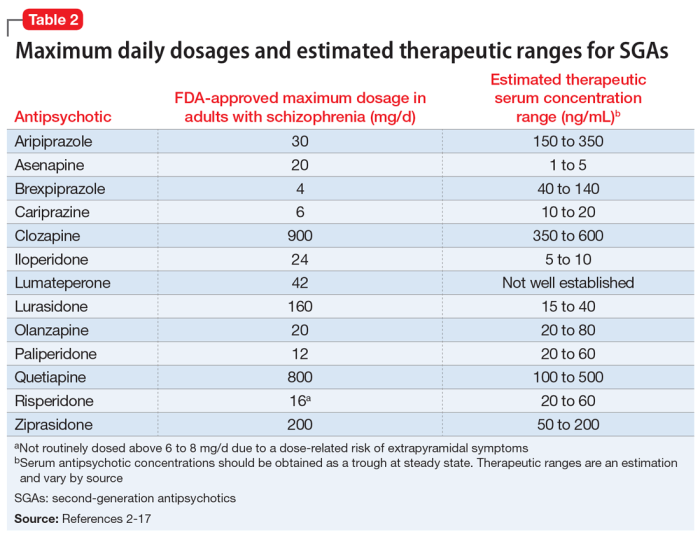
Embarking on a journey through the realm of psychiatric medications in 2025, this piece delves into the importance of safety and effectiveness in the treatment of mental health disorders. As we navigate the landscape of evolving medications, key factors driving their development come to light, offering a glimpse into the future of psychiatric treatment.
Overview of Top Psychiatric Medications in 2025
Psychiatric medications play a crucial role in the treatment of mental health disorders, providing relief for individuals struggling with conditions such as depression, anxiety, bipolar disorder, and schizophrenia. These medications help to balance neurotransmitters in the brain, improving symptoms and overall quality of life for patients.Over the years, psychiatric medications have evolved significantly, with advancements in pharmacology leading to the development of more targeted and effective treatments.
The introduction of selective serotonin reuptake inhibitors (SSRIs), serotonin-norepinephrine reuptake inhibitors (SNRIs), atypical antipsychotics, and mood stabilizers has revolutionized the field of psychiatry, offering new options for patients with varying needs.In 2025, key factors are driving the development of psychiatric medications, including advances in neuroscience, genetics, and personalized medicine.
Researchers are focusing on identifying biomarkers and genetic factors that can help predict an individual’s response to specific medications, allowing for more tailored and effective treatment plans. Additionally, there is a growing emphasis on developing medications with fewer side effects and improved safety profiles, enhancing the overall tolerability and compliance of patients undergoing treatment for mental health disorders.
Safety of Psychiatric Medications

When it comes to prescribing psychiatric medications, safety considerations are paramount. The potential side effects, drug interactions, and overall impact on a patient’s well-being must be carefully assessed to ensure the best possible outcomes.
Comparison of Traditional vs. Newer Psychiatric Medications
Traditional psychiatric medications, such as older generation antipsychotics and antidepressants, often come with a range of side effects that can be challenging for patients to tolerate. These side effects may include weight gain, sexual dysfunction, and increased risk of metabolic disorders.
On the other hand, newer psychiatric medications, including atypical antipsychotics and selective serotonin reuptake inhibitors (SSRIs), have been developed with a focus on improving safety profiles. These newer options tend to have fewer side effects and a more favorable tolerability profile for many patients.
Advancements in Technology and Research
Advancements in technology and research have greatly enhanced the safety of psychiatric medications. For example, the use of pharmacogenetic testing allows healthcare providers to personalize medication regimens based on an individual’s genetic makeup, helping to predict how a patient may respond to a specific medication and potentially reducing the risk of adverse reactions.
Additionally, ongoing clinical trials and research studies continue to explore new treatment options with improved safety profiles, providing hope for better outcomes and quality of life for individuals living with psychiatric conditions.
Effectiveness of Psychiatric Medications
Psychiatric medications play a crucial role in managing various mental health conditions by targeting specific symptoms and improving overall well-being. In recent years, advancements in pharmacology have led to the development of highly effective medications that have significantly improved the quality of life for many individuals.
Examples of Psychiatric Medications for Specific Mental Health Conditions
- Antidepressants like SSRIs (Selective Serotonin Reuptake Inhibitors) such as Prozac and Zoloft are known for effectively treating depression and anxiety disorders.
- Atypical antipsychotics like Abilify and Risperdal are effective in managing symptoms of schizophrenia and bipolar disorder.
- Mood stabilizers such as Lithium and Depakote are commonly used to treat bipolar disorder and stabilize mood swings.
Personalized Medicine in Psychiatric Medications
Personalized medicine has revolutionized the field of psychiatry by tailoring treatment plans to individual patients based on their genetic makeup, lifestyle, and unique symptoms. This approach allows healthcare providers to prescribe medications that are more likely to be effective and have fewer side effects for each patient, ultimately improving treatment outcomes.
Impact of Combination Therapies on Effectiveness
Combination therapies, which involve using multiple psychiatric medications concurrently, have shown to be highly effective in managing complex mental health conditions that do not respond well to monotherapy. By targeting different neurotransmitters and symptoms simultaneously, combination therapies can enhance the overall effectiveness of treatment and improve patient outcomes.
Future Trends in Psychiatric Medications
In the ever-evolving field of psychiatric medications, several trends are shaping the future landscape of mental health treatment. Let’s delve into some of the key developments that are expected to influence the way psychiatric medications are developed and utilized in the coming years.
Advancements in Pharmacogenomics
Advancements in pharmacogenomics, the study of how genes affect a person’s response to drugs, are poised to revolutionize the development of psychiatric medications. By analyzing an individual’s genetic makeup, healthcare providers can tailor treatment plans to optimize efficacy and minimize adverse effects.
This personalized approach holds the promise of improving treatment outcomes and reducing the trial-and-error process often associated with finding the right medication for a patient.
Role of Digital Therapeutics
Digital therapeutics, such as mobile apps and online programs designed to deliver therapeutic interventions, are increasingly being recognized for their potential to complement traditional psychiatric medications. These digital tools offer innovative ways to provide support, monitor symptoms, and deliver evidence-based interventions to individuals with mental health conditions.
Integrating digital therapeutics with pharmacological treatments can enhance overall treatment effectiveness and promote better mental health outcomes.
Emerging Trends in Drug Delivery Systems
Advances in drug delivery systems are opening up new possibilities for how psychiatric medications are administered. From long-acting injectables to implantable devices, these innovative delivery methods aim to improve treatment adherence, reduce dosing frequency, and enhance the overall patient experience.
By exploring novel drug delivery systems, researchers are seeking to address the challenges associated with medication compliance and optimize the therapeutic benefits of psychiatric treatments.
Outcome Summary
Concluding our exploration of Top Psychiatric Medications in 2025: Safety and Effectiveness, it’s evident that the landscape of mental health treatment is rapidly evolving. With safety considerations at the forefront and a focus on enhancing effectiveness through personalized approaches, the future of psychiatric medications holds promise for improved patient outcomes.
Questions and Answers
What are some common side effects of psychiatric medications?
Common side effects may include nausea, dizziness, weight gain, and drowsiness. It’s important to consult with your healthcare provider if you experience any concerning symptoms.
How long does it typically take for psychiatric medications to start working?
The timeframe varies depending on the individual and the medication, but it can take anywhere from a few days to a few weeks to notice the full effects of psychiatric medications.
Are there any natural alternatives to psychiatric medications?
Some people explore natural alternatives such as therapy, lifestyle changes, and herbal supplements. It’s essential to consult with a healthcare professional before making any changes to your treatment plan.













